Don’t invest unless you’re prepared to lose all the money you invest. This is a high‑risk investment and you should not expect to be protected if something goes wrong. Take 2 mins to learn more.
Buy 1inch (1INCH) in UK With GBP | CoinJar
1inch
1INCH
What is 1inch?
How to buy 1inch: Why do investors like this token? In a nutshell, 1inch is like a smart shopping assistant for cryptocurrency traders. Imagine you’re shopping online, and you want to buy a product. Instead of going to just one store, you use a tool to check multiple websites to find competitive deals. 1inch does something similar but for crypto trading.
Here’s how it works.
Comparison shopping
1inch compares cryptocurrency prices across several popular exchanges in the decentralised exchange (DEX) ecosystem.
It looks at different platforms to find competitive rates for the crypto swaps you want to make.
Just like a coupon aggregator finds competitive deals for consumers, 1inch finds competitive rates for traders.
No middleman
1inch is a non-custodial exchange, which means it doesn’t hold your funds. You need a third-party wallet to use its services.
Wallets store the keys (codes) that let you control your crypto coins.
How it helps traders
If you’re trading one crypto for another (say, swapping Ethereum for Bitcoin), 1inch checks various exchanges to get you a competitive rate.
It might even split your swap across different exchanges to give you an even better deal. Plus, you can set a limit order, specifying the price you want to pay, and 1inch will execute the trade only if the currency reaches that rate.
Why would investors buy 1inch?
Best rates
Investors buy it because it finds competitive rates for their trades.
Competitive fees means possible investor returns, and the protocol helps you secure competitive fees.
No fees
Unlike some exchanges, 1inch doesn’t charge additional fees for using its services. No withdrawal or deposit fees either.
Huge range of cryptocurrencies
1inch supports a wide variety of cryptocurrencies. Whether you’re into Bitcoin, Ethereum, or lesser-known altcoins, you'll likely benefit from being involved with the platform.
Liquidity mining and staking
Token holders can use it for trading and paying gas fees.
They can also participate in liquidity mining (earning rewards by contributing to the 1inch liquidity pool) and staking.
Conclusion: Why investors buy 1inch
In summary, 1inch is like your crypto-savvy friend who always knows where to find competitive deals. It is a tool that could optimise crypto trading.








Cash, credit or crypto?
Buy 1inch using Visa or Mastercard. Get cash in your account with Faster Payments Service (FPS). Convert crypto-to-crypto with a single click.How to buy 1inch with CoinJar
Start your cryptocurrency portfolio with CoinJar by following these steps.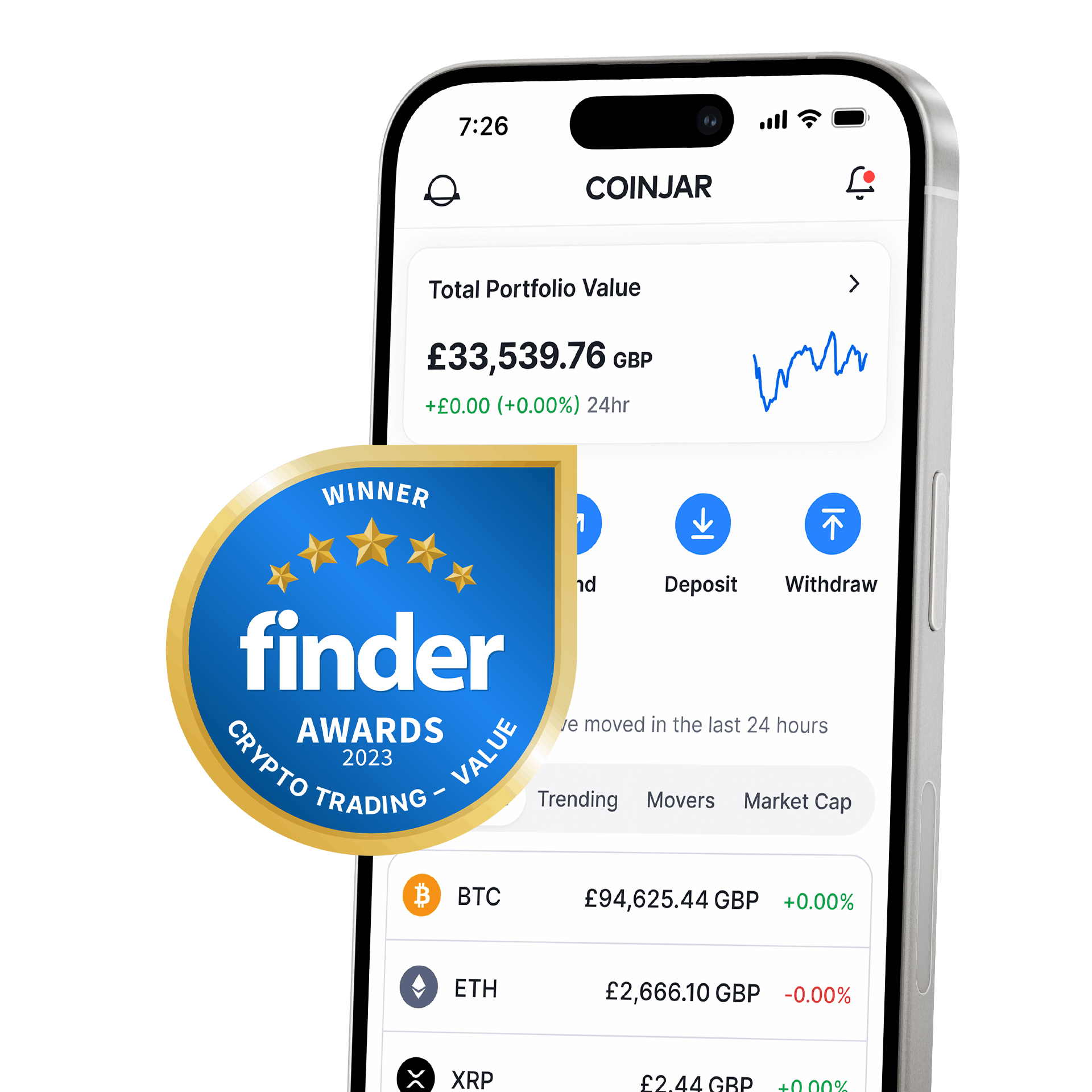
Finder Awards Winner 2023
CRYPTO TRADING - VALUEFinder Awards Winner 2023
CRYPTO TRADING - VALUE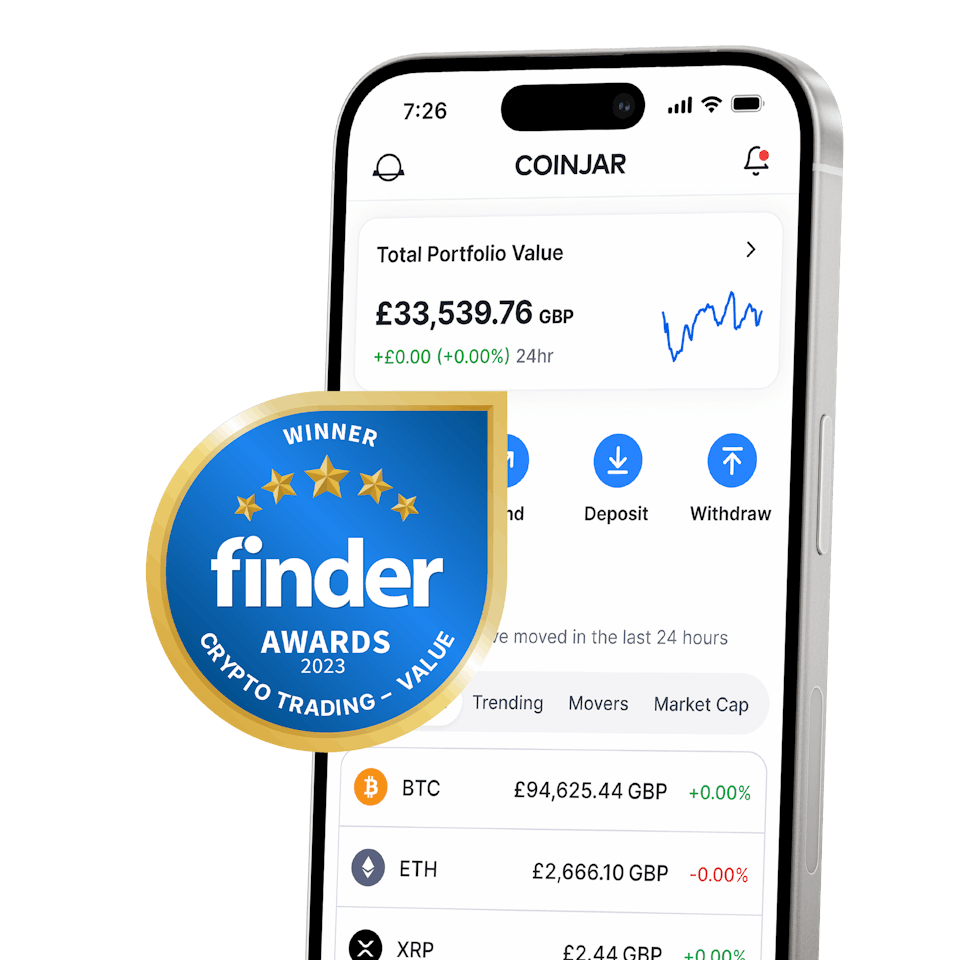
Featured In

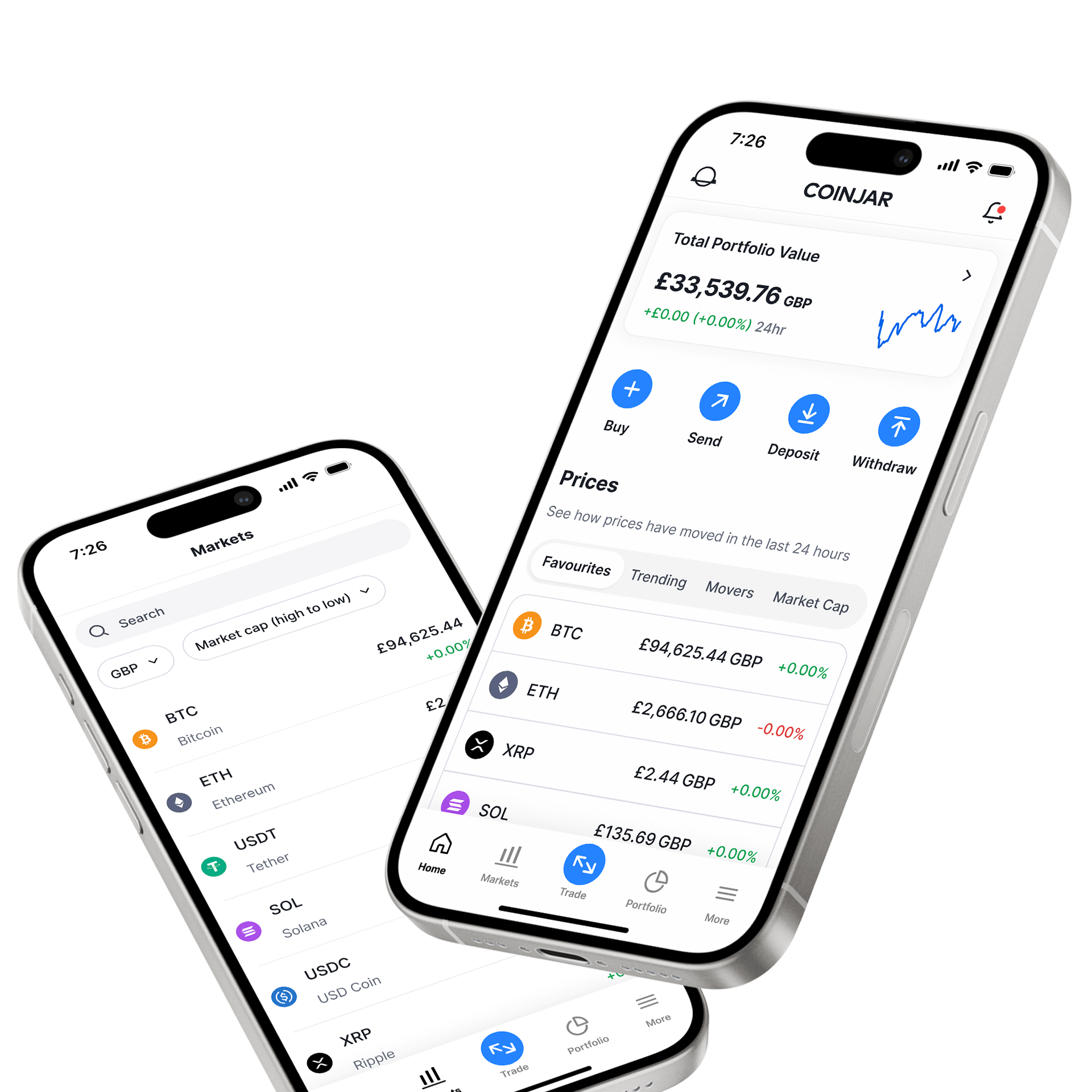
CoinJar App
All-in-one crypto walletCoinJar App
All-in-one crypto wallet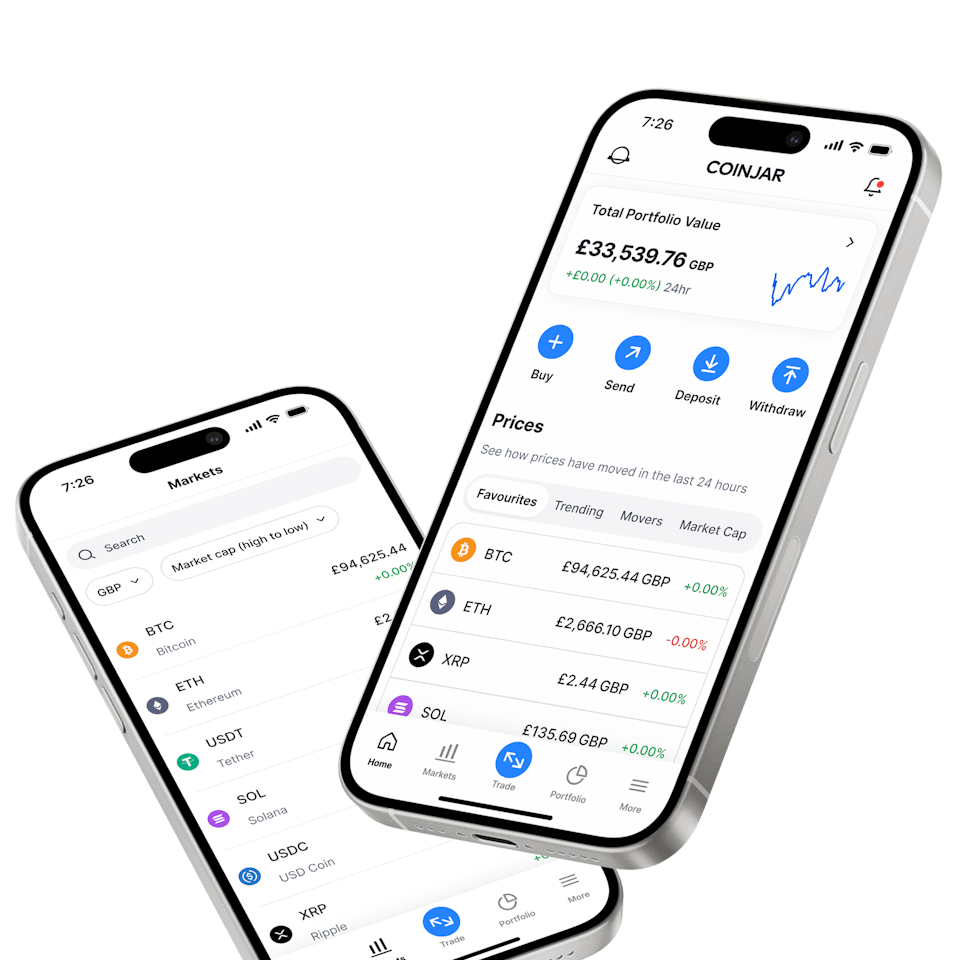
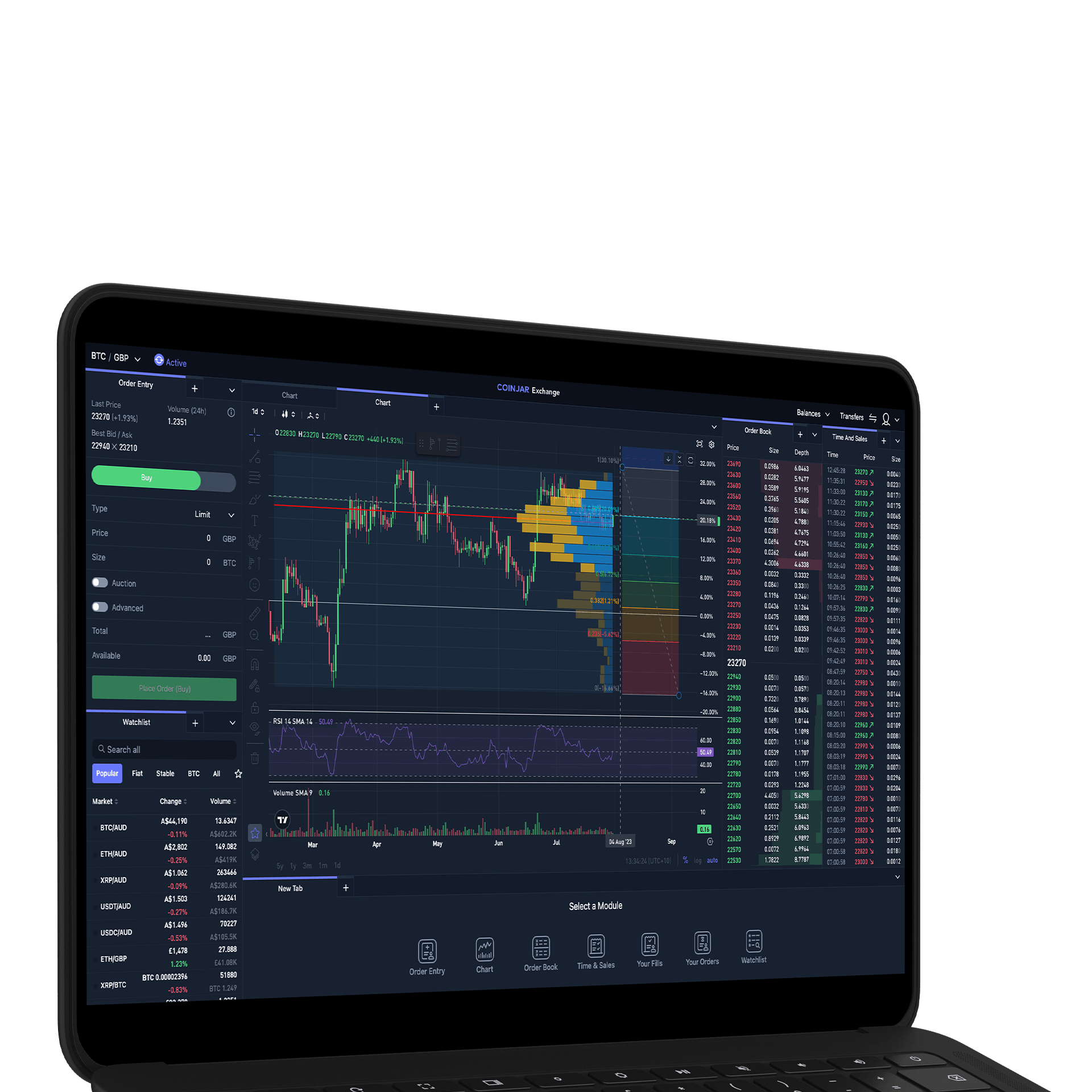
CoinJar Exchange
FOR PROFESSIONAL CRYPTO TRADERS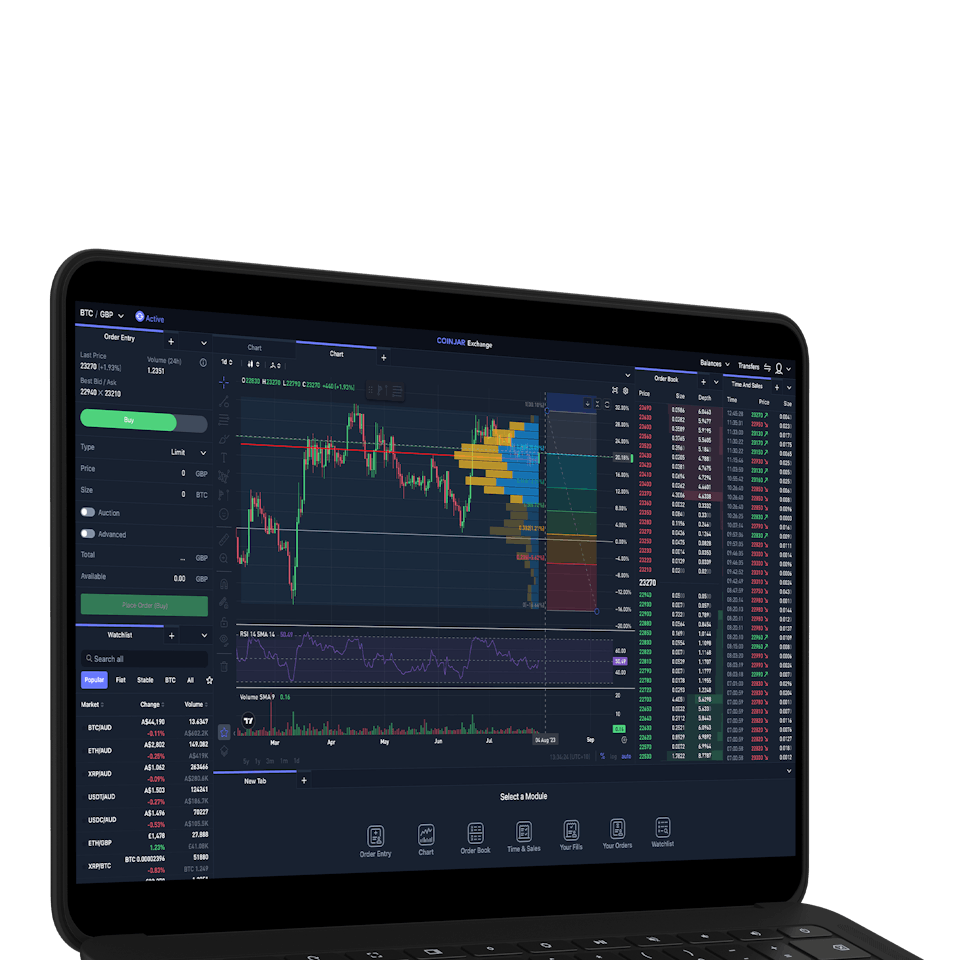
CoinJar Exchange
FOR PROFESSIONAL CRYPTO TRADERS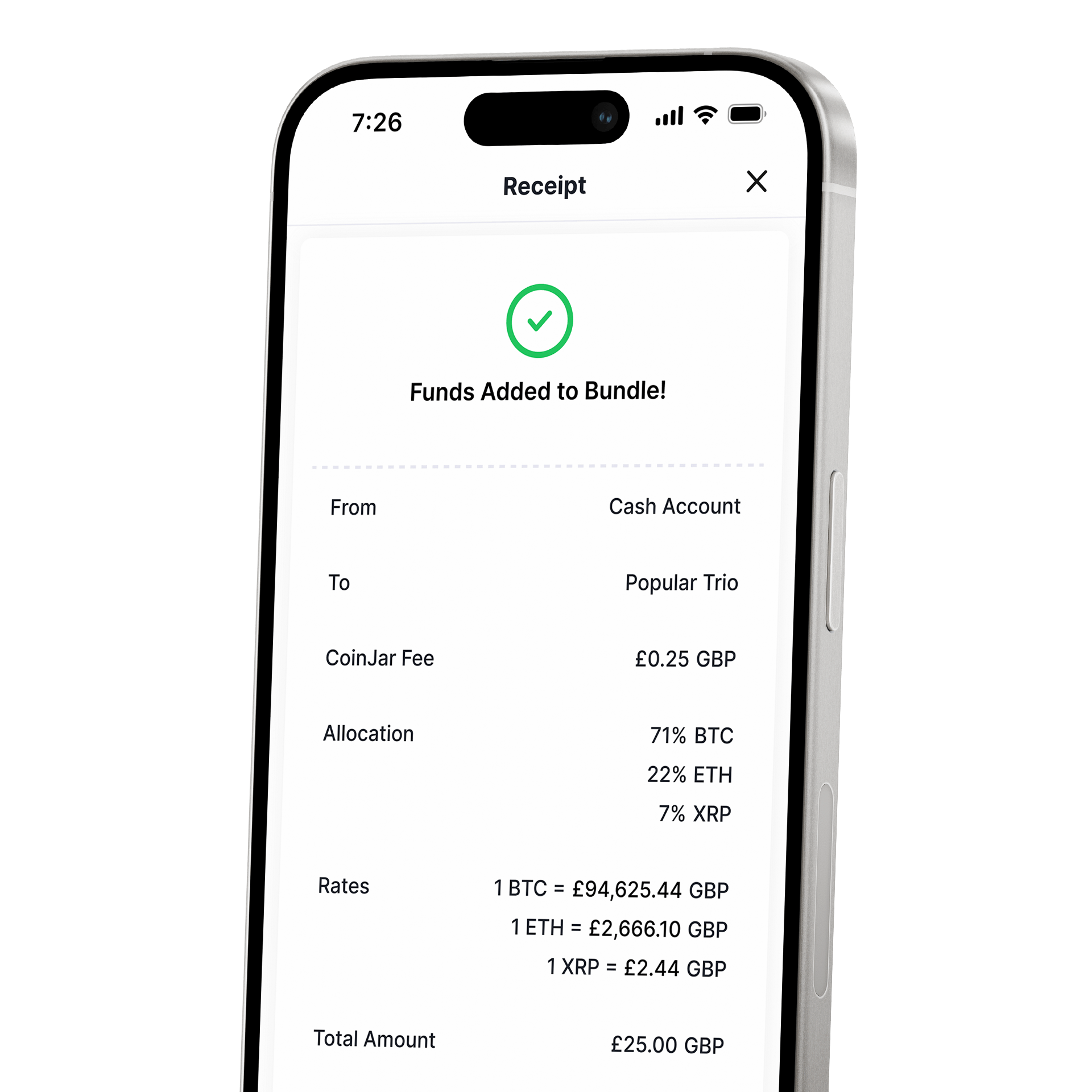
CoinJar DCA & Bundles
AUTOMATE & DIVERSIFY YOUR PORTFOLIOCoinJar DCA & Bundles
AUTOMATE & DIVERSIFY YOUR PORTFOLIO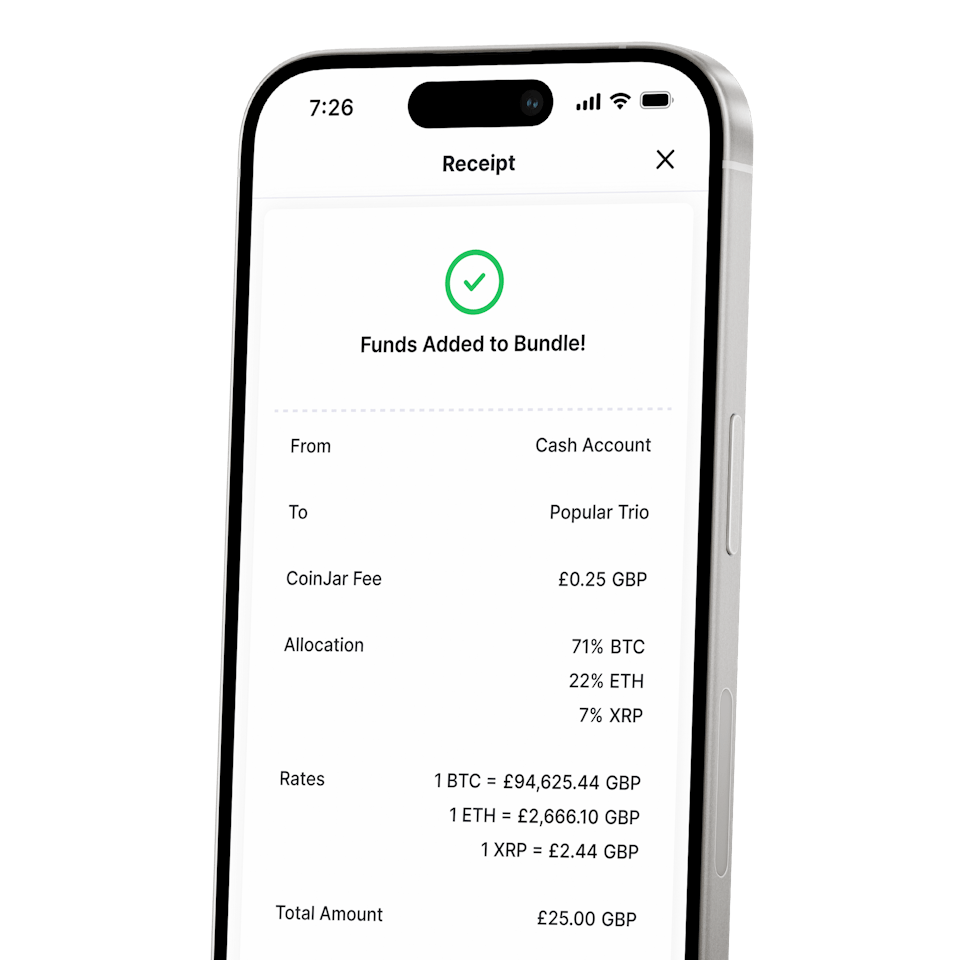
Frequently asked questions
What Is 1inch?
It is a decentralised exchange (DEX) aggregator. It helps crypto traders find the best rates and lowest fees by comparing prices across various exchanges in the DeFi space. Think of it as a smart shopping assistant for crypto swaps!
Standard Risk Warning: The above article is not to be read as investment, legal or tax advice and it takes no account of particular personal or market circumstances; all readers should seek independent investment advice before investing in cryptocurrencies.
The article is provided for general information and educational purposes only, no responsibility or liability is accepted for any errors of fact or omission expressed therein. Past performance is not a reliable indicator of future results.
We use third party banking, safekeeping and payment providers, and the failure of any of these providers could also lead to a loss of your assets. We recommend you obtain financial advice before making a decision to use your credit card to purchase cryptoassets or to invest in cryptoassets. Capital Gains Tax may be payable on profits.
CoinJar's digital currency exchange services are operated in the UK by CoinJar UK Limited (company number 8905988), registered by the Financial Conduct Authority as a Cryptoasset Exchange Provider and Custodian Wallet Provider in the United Kingdom under the Money Laundering, Terrorist Financing and Transfer of Funds (Information on the Payer) Regulations 2017, as amended (Firm Reference No. 928767). In the UK, it's legal to buy, hold, and trade crypto, however cryptocurrency is not regulated in the UK.
It's vital to understand that once your money is in the crypto ecosystem, there are no rules to protect it, unlike with regular investments. You should not expect to be protected if something goes wrong. So, if you make any crypto-related investments, you're unlikely to have recourse to the Financial Services Compensation Scheme (FSCS) or the Financial Ombudsman Service (FOS) if something goes wrong.
The performance of most cryptocurrency can be highly volatile, with their value dropping as quickly as it can rise. Past performance is not an indication of future results. Remember: Don't invest unless you're prepared to lose all the money you invest. This is a high-risk investment and you should not expect to be protected if something goes wrong. Take 2 mins to learn more at: https://www.coinjar.com/uk/risk-summary.
UK residents are required to complete an assessment to show they understand the risks associated with what crypto/investment they are about to buy, in accordance with local legislation. Additionally, they must wait for a 24-hour "cooling off" period, before their account is active, due to local regulations. If you use a credit card to buy cryptocurrency, you would be putting borrowed money at a risk of loss.
We recommend you obtain financial advice before making a decision to use your credit card to purchase cryptoassets or to invest in cryptoassets.
Specific risks associated with DeFi tokens Decentralised Finance (or 'DeFi') tokens (e.g. UNI, AAVE) are crypto-assets linked to financial applications and protocols built on decentralised blockchain technology. DeFi tokens carry the following risks:
Smart contract risk: DeFi relies heavily on smart contracts. Even a minor coding error or oversight can lead to a contract being exploited, potentially resulting in significant losses for DeFi tokens.
Regulatory risk: DeFi operates in a decentralised manner, often without intermediaries or financial crime controls. Regulatory bodies across jurisdictions might introduce new regulations impacting the use, value, or legality of certain DeFi protocols or assets.
Rug-pulls / Exit scams: Some DeFi projects might be launched by anonymous or pseudonymous teams, increasing the risk of "rug pulls" where developers abandon the project and withdraw funds, leaving investors with worthless tokens.
Data/oracle risk: DeFi protocols often rely on external data sources or 'oracles. Manipulation or inaccuracies in these data sources can lead to unintended financial outcomes within the protocols. Protocol complexity: The complexity of some DeFi protocols can make it difficult for average users to fully understand the mechanisms and associated risks.
Specific risks associated with meme coins:
'Meme coins' (e.g. DOGE, SHIB, PEPE) are crypto-assets whose value is driven primarily by community interest and online trends.
Meme coins carry the following risks:
Volatility risk: Meme coins can have extreme price volatility, often experiencing rapid and unpredictable price fluctuations within short periods. The value of meme coins can be influenced by social media trends, celebrity endorsements, and other factors unrelated to traditional investment fundamentals. Lack of utility: Meme coins often lack intrinsic value or utility, being primarily driven by community interest, online trends, and speculative trading.
Market manipulation: Meme coins may be susceptible to increased risk of market manipulation including 'pump-and-dump' schemes, where the price is artificially inflated followed by a sudden crash.
Lack of transparency: Meme coins may have limited available information about their development teams, goals, and financials. This lack of transparency can make it challenging to assess the credibility and potential of a meme coin accurately.
Emotional investing: Meme coins often garner strong emotional reactions from investors, leading to impulsive decisions. Emotional trading activity can amplify losses.
Specific risks associated with stablecoins:
There is a risk that any particular stablecoin may not hold their value as against any fiat currency; or may not hold their value as against any other asset. Stablecoins carry the following risks:
Depegging events: Depegging events may occur with stablecoins that fail to maintain adequate controls and risk mitigants. A depegging event is when the value of the stablecoin no longer matches the value of the underlying asset. This could result in a loss of some or all of your investment.
Counterparty risk: Counterparty risk arises when an asset is backed by collateral, involving a third party maintaining the collateral, which introduces risk if the party becomes insolvent or fails to maintain it.
Redemption risk: Redemption risk refers to the possibility that an asset's ability to be redeemed for underlying collateral may not be as anticipated during market fluctuations or operational issues.
Collateral risk: Collateral risk refers to the possibility of the collateral's value declining or becoming volatile, potentially impacting the asset's stability, particularly when it is another crypto-asset.
Exchange rate fluctuations: Stablecoins, often denominated in US Dollars, expose investors to fluctuations in the USD:GBP exchange rate. Algorithmic risk: Algorithm risk refers to the possibility of an asset's stability being compromised due to unexpected failure or behaviour of the underlying algorithm, potentially leading to loss of value.
CoinJar does not endorse the content of, and cannot guarantee or verify the safety of any third-party websites. Visit these websites at your own risk.
Your information is handled in accordance with CoinJar’s Privacy Policy.
Cryptoassets traded on CoinJar UK Limited are largely unregulated in the UK, and you are unable to access the Financial Service Compensation Scheme or the Financial Ombudsman Service.
We use third party banking, safekeeping and payment providers, and the failure of any of these providers could also lead to a loss of your assets.
We recommend you obtain financial advice before making a decision to use your credit card to purchase cryptoassets or to invest in cryptoassets. Capital Gains Tax may be payable on profits.
CoinJar’s digital currency exchange services are operated in the UK by CoinJar UK Limited (company number 8905988), registered by the Financial Conduct Authority as a Cryptoasset Exchange Provider and Custodian Wallet Provider in the United Kingdom under the Money Laundering, Terrorist Financing and Transfer of Funds (Information on the Payer) Regulations 2017, as amended (Firm Reference No. 928767).
Apple Pay and Apple Watch are trademarks of Apple Inc. Google Pay is a trademark of Google LLC.
This site is protected by reCAPTCHA and the Google Privacy Policy and Terms of Service apply.

